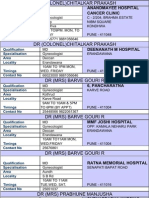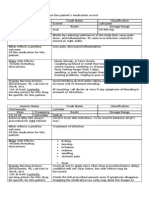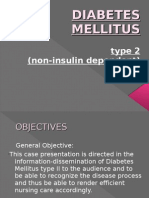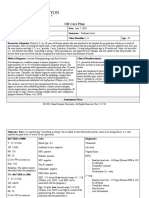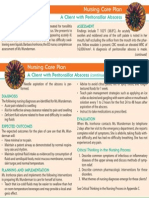Case Simulation 123 Ijcg
Case Simulation 123 Ijcg
Uploaded by
Irish Jane GalloCopyright:
Available Formats
Case Simulation 123 Ijcg
Case Simulation 123 Ijcg
Uploaded by
Irish Jane GalloOriginal Title
Copyright
Available Formats
Share this document
Did you find this document useful?
Is this content inappropriate?
Copyright:
Available Formats
Case Simulation 123 Ijcg
Case Simulation 123 Ijcg
Uploaded by
Irish Jane GalloCopyright:
Available Formats
Name: Gallo, Irish Jane, Campo
Section/Group: BSN2A/GROUP2
Case Simulation 123
INSTRUCTIONS:
All questions apply to this case study. Your responses should be brief and to the point. When asked to provide several answers, list
them in order of priority or significance. Do not assume information that is not provided. Please print or write clearly. If your response
is not legible, it will be marked as? and you will need to rewrite it.
Scenario
You are working as the triage nurse in the emergency department at a busy tertiary care center. A woman comes in complaining of
very heavy vaginal bleeding and extreme pain. S.K. is single, 47 years of age, and as been bleeding for 24 hours, soaking a pad an
hour. She works in a law firm as a paralegal and was embarrassed yesterday when she leaked around her pad and stained a chair in the
conference room. She has two sexual partners currently and has been relying on condoms for birth control. She thinks her last
menstrual period was 2 months ago, but they have been irregular and she is not sure. She has had some occasional spotting during the
past 6 months. She states she is afraid of the amount of bleeding in the past 24 hours.
1. Identify three conditions that would require emergency care and could prove life threatening.
The severe bleeding could possibly be severe menorrhagia or it could be an ectopic pregnancy. If the bleeding continues,
S.K. could go into hypovolemic shock. If emergency care is not sought out and is left untreated, the ectopic pregnancy and
hypovolemic shock could be fatal.
2. She asks you, “Could I be pregnant?” How will you respond?
I would respond by asking her when was the last time she was sexually active and if protection was used. I would also let her
know that pregnancy could be a possibility but the pregnancy test will be done to know for sure.
3. You ask her how she would feel if she was pregnant, and she says, “It would ruin my life.” She states she is a single mother
with two children in junior high school. What can you tell her to help her with her obvious distress?
First is establishing rapport to our patient, to build trust between nurse and the patient.
Ask her why she feels it would ruin her life, in what aspect? – Allow her to express feelings.
Inform her of options available if she is pregnant- adoption, abortion, or outside resources that could help financially if she
decides to keep the baby.
Use supportive expressions to relieve their distress and always be positive in front of them and smile always. Imagine
ourselves in their situation to easily understand what they want to say and speak always gently and softly, talk in a way that
inspires hope and without touching or hugging( some are like it but other’s don’t)
Refer her to counselor to talk about her feelings
Respond to Distress Using NURSE TECHNIQUE
N- aming: “ I can see this is not what you expected to hear”
U-nderstanding: “I can only imagine how you may be feeling right now. Is there anything you want to talk about?”
R-especting: “You have shown a lot of courage through all this.”
S-upporting: I will be here with you through this.”
E-xploring: Tell me more about what is affecting you? Tell me more about what upsets/scares you the most”.
4. Describe the assessment you would need to perform to differentiate what might be occurring with S.K.
Assess the cause of abnormal bleeding or excessive bleeding and extreme pain.
Pelvic Exam
Blood test including a blood clotting profile, hormones test, Test for sexually transmitted diseases.
Pain Scale Assessment
Chart View
5. Interpret S.K.'s laboratory results and vital signs.
Laboratory Test Results
Hgb 12.2 g/dL
Hct 44%
RBC 4.2 dL
Vital Signs
Blood pressure 110/68 mm Hg
Heart rate 88 beats/min
Respiratory rate 22 breaths/min
The Laboratory results shows that Hgb 12.2 grams per deciliter (normal-12.0 to 15.5 grams per deciliter), Hct is 44% which is normal
(36.1% to 44.3 %), RBC 4.2 deciliter (normal) In vital signs, Blood Pressure 110/68 mmHg which is not normal because the normal
range would be less than 120 and less than 80 and the normal range of patient age in blood pressure would be 124 over 78.5 mmHg.
Heart rate 88 beats per minute normal because the normal adults ranges is 60 to 100 beats per minute. Respiratory Rate 22 breaths per
minute, it is not normal in adult at rest (12 to 20 breaths per minute)
CASE STUDY PROGRESS
You determine that S.K. is stable at the present level of bleeding; she is not diaphoretic or pale. The physician orders an ultrasound
(US) to determine whether she is pregnant and to evaluate some possible causes of her bleeding. During her US, her blood pressure
drops to 90/42 mm Hg, and she complains of considerable cramping.
CHART VIEW
Physician's Orders
Infuse 1 L of D5LR over 4 hours
Meperidine (Demerol) 25 mg IV now
6. Before administering the meperidine (Demerol), what will you ask her?
Before administering I would ask for any allergies, a pain assessment and what other medications is currently taking.
We need to know the medical history of the patient, especially if the patient has brain disorders (such as head injury, tumor,
seizures) breathing problems(asthma, sleep apnea, chronic obstructive pulmonary disease COPD), gallbladder, disease,
kidney disease, mental/ mood disorders and family history.
7. What precautions do you need to take while administering the meperidine (Demerol)?
Take meperidine exactly as directed. Do not take more of it and more often,
Before Taking Meperidine: Tell your doctor if you are allergic in meperidine, any other medications. You should know that
meperidine may take you drowsy. Do not drive a car or operate machinery until you know how this medication affects you.
This is more common that when you are first taking meperidine you are experiencing dizziness, lightheadedness, and fainting
when you get up too quickly from a lying position. To avoid this problem get out of bed slowly, resting your feet on the floor
for a few minutes before standing up.
8. You are preparing to infuse the D5LR. The available IV tubing supplies 15 gtt/mL. At how many gtts/min will you regulate
the infusion?
(1000ml x 15 gtt/min) / (4hrs X 60 min) = 32.60 > 33 gtt/min
CASE STUDY PROGRESS
Her US is negative for pregnancy; she does not have an ectopic or intrauterine pregnancy. The US shows a very thick endometrial
lining, even after 24 hours of bleeding.
9. S.K. is obviously relieved about not being pregnant, but she expresses fear that this could be cancer. What should you tell her to
reassure her?
I would let her know that the bleeding could be due to several reasons and not specifically cancer, and that the doctor didn’t not find
any suspicion of cancer in her ultrasound if he did he would be discussing option now. A test she could have done to rule out or
confirm cancer is a biopsy.
10. S.K. asks what she can do to keep this from happening again. Please respond.
Check and Monitor the monthly period (Regular or Irregular)
If the she is sexually active (don’t forget to used a contraceptive to avoid STD)
11. What risk factors will you ask her about before discussing birth control pills as a treatment option?
If she has a history of thrombophlebitis disease, liver disease, gallbladder disease, hypertension. Diabetes, migraines, hypercoagulable
disorders, hyperlipidemia, heavy smoking, or undiagnosed uterine bleeding.
12. If S.K. is prescribed birth control pills for the treatment of her bleeding problem, what other risks should she be aware of if she is
using the pills for birth control?
That birth control pills increased the risk of myocardial infarction, thromboembolic disorders( blood clots) and stroke.
CASE STUDY PROGRESS
S.K. is more comfortable now. The physician suggests birth control pills to control her bleeding. He tells her to take one pill, four
times a day for the next 5 days or until her bleeding stops. Once the bleeding has stopped, she should continue using the medication,
one pill/day, for the rest of the cycle. Because she will need to continue the pills for at least 3 months, she will need to follow up with
her OB/GYN.
13. What warning signs and symptoms do you want to tell her about as she starts her contraceptive pills?
Warning Signs to report are depression, breast lump, jaundice, several abdominal or leg pain, severe chest pain, or shortness of breath,
headaches or dizziness, eye vision loss or blurring, speech problems.
14. Which statements indicate that S.K. understands the discharge instructions? (Select all that apply.)
a. “I will call if I continue to have heavy bleeding, soaking a pad an hour.”
b. “I can take three hundred twenty-five milligrams of aspirin every six hours for the cramping pain.”
c. “If I get dizzy or feel my heart beating funny, I will come back to the ER.”
d. “I will avoid sexual intercourse until the bleeding has completely stopped.”
e. “I will try to eat more beans and spinach over the next several days.”
You might also like
- List of Doctors - PuneDocument130 pagesList of Doctors - Punercpawar79% (52)
- Marquez - Case Study 4Document4 pagesMarquez - Case Study 4Caren MarquezNo ratings yet
- Ba GastrectomyDocument10 pagesBa GastrectomyHope3750% (2)
- Sbar Template RN ToDocument2 pagesSbar Template RN ToInes100% (2)
- Sample Soap NoteDocument12 pagesSample Soap NoteSedaka Donaldson0% (1)
- Case StudyDocument49 pagesCase StudyLennie Marie B Pelaez100% (1)
- NANDA Nursing DiagnosesDocument8 pagesNANDA Nursing DiagnosesShreejana PrajapatiNo ratings yet
- Case Study 114: ScenarioDocument4 pagesCase Study 114: ScenarioPrincess Levie CenizaNo ratings yet
- Juvenile Rheumatoid ArthritisDocument3 pagesJuvenile Rheumatoid ArthritisYnos Sta TeresaNo ratings yet
- Eating DisordersDocument17 pagesEating Disordersdragonfighter63No ratings yet
- Palliative Care Case Study: Qamar Abbas Deputy Medical Director ST Clare HospiceDocument12 pagesPalliative Care Case Study: Qamar Abbas Deputy Medical Director ST Clare HospicePraba KaranNo ratings yet
- Chapter 46 Pain ManagementDocument4 pagesChapter 46 Pain ManagementBrittania CorbittNo ratings yet
- Defense Mechanisms OutlineDocument4 pagesDefense Mechanisms OutlineOnkwani DavidNo ratings yet
- Reflection 1Document4 pagesReflection 1api-271855323No ratings yet
- Reflection 2Document11 pagesReflection 2MA SumalinogNo ratings yet
- A Case Study On Acute Tonsillopharyngitis: Bulacan State University City of Malolos, Bulacan College of NursingDocument61 pagesA Case Study On Acute Tonsillopharyngitis: Bulacan State University City of Malolos, Bulacan College of NursingHomework PingNo ratings yet
- NCP CHF Er SettingDocument9 pagesNCP CHF Er SettingroseasNo ratings yet
- Girl Interrupted Moview Review Final As inDocument3 pagesGirl Interrupted Moview Review Final As inkclsolimanNo ratings yet
- Nursing Care Plans For UTIDocument2 pagesNursing Care Plans For UTIHannah Pin67% (3)
- Catholic Faith: Clinical Worksheet: Nursing Process Care PlanDocument18 pagesCatholic Faith: Clinical Worksheet: Nursing Process Care Planmuhammad adilNo ratings yet
- HA RLE WS # 4 Assessing Psychosocial Cognitive and Moral DevelopmentDocument6 pagesHA RLE WS # 4 Assessing Psychosocial Cognitive and Moral DevelopmentJULIE ANNE CORTEZNo ratings yet
- Process Recording 360Document9 pagesProcess Recording 360MarvinNo ratings yet
- Care Plan - Chronic PainDocument4 pagesCare Plan - Chronic Painapi-246639896No ratings yet
- Hepatic EncephalopathyDocument16 pagesHepatic EncephalopathyChenyuZhu100% (1)
- Concept Map For Paranoid SchizzopreniaDocument4 pagesConcept Map For Paranoid SchizzopreniaJu Lie Ann100% (1)
- Case Study PP - AdhdDocument21 pagesCase Study PP - Adhdapi-482726932100% (1)
- Medication SheetDocument4 pagesMedication SheetJasleen AilenNo ratings yet
- Doctor's OrderDocument3 pagesDoctor's OrderStephen S. PadayhagNo ratings yet
- Nursing Interventions CHFDocument3 pagesNursing Interventions CHFbanyenye25100% (1)
- Handling The Angry PatientDocument3 pagesHandling The Angry PatientbhongskirnNo ratings yet
- Progress Report FinalDocument9 pagesProgress Report Finalapi-263201979No ratings yet
- Health Education PlanDocument10 pagesHealth Education PlanJulienne Sanchez-SalazarNo ratings yet
- Obstetric Nursing Care PlanDocument30 pagesObstetric Nursing Care PlanReshma KambleNo ratings yet
- Reflective Journal Med Surg Clinical April 14thDocument3 pagesReflective Journal Med Surg Clinical April 14thapi-238869728No ratings yet
- Problem Oriented ChartingDocument27 pagesProblem Oriented Chartingkyuss2No ratings yet
- Case Study Patho W1 A1Document6 pagesCase Study Patho W1 A1BettNo ratings yet
- Interaction AnalysisDocument2 pagesInteraction Analysisapi-302499446No ratings yet
- Careplan 2 NSG 434 CCDocument8 pagesCareplan 2 NSG 434 CCapi-509642710No ratings yet
- Angela CVDocument3 pagesAngela CVapi-593362158No ratings yet
- Diabetes MellitusDocument9 pagesDiabetes MellitusJulius Ceasar SincoNo ratings yet
- Nasogastric FeedingDocument2 pagesNasogastric FeedingShella LaguatanNo ratings yet
- Head InjuryDocument9 pagesHead InjuryRaveen mayiNo ratings yet
- N375 Critical Thinking Activity ExampleDocument6 pagesN375 Critical Thinking Activity ExamplefaizaNo ratings yet
- Postpartum Head To Toe Assessment/ Bubble HeDocument2 pagesPostpartum Head To Toe Assessment/ Bubble HeJariel CatacutanNo ratings yet
- Health Assessment Complete 2Document14 pagesHealth Assessment Complete 2kimberly100% (1)
- Nursing Care PlanDocument6 pagesNursing Care PlanChesca MejiaNo ratings yet
- Ovarian Hyperstimulation Syndrome Diagnosis and ManagementDocument21 pagesOvarian Hyperstimulation Syndrome Diagnosis and ManagementNur AnindyaNo ratings yet
- 1 Endorsement NotesDocument2 pages1 Endorsement NotesLorraine GambitoNo ratings yet
- Addison's Syndrome DiseaseDocument2 pagesAddison's Syndrome DiseaseNP YarebNo ratings yet
- Mature CataractDocument24 pagesMature CataractmethadamayNo ratings yet
- Pontine BleedingDocument99 pagesPontine BleedingJeffrey Dela CruzNo ratings yet
- Elderly Nursing Case StudyDocument13 pagesElderly Nursing Case StudysatraNo ratings yet
- Case Study of Bronchial Asthma in Acute ExacerbationDocument19 pagesCase Study of Bronchial Asthma in Acute ExacerbationEzra Dizon ManzanoNo ratings yet
- Objectives For Pedia RotationDocument1 pageObjectives For Pedia RotationRoselle Marie TayoNo ratings yet
- OB Care Plan: Assessment DataDocument12 pagesOB Care Plan: Assessment Dataapi-520985654No ratings yet
- A Case Presentation Age Final1Document100 pagesA Case Presentation Age Final1Joanne Bernadette AguilarNo ratings yet
- Case Study On Ibd17Document2 pagesCase Study On Ibd17api-381128376No ratings yet
- JINGCO - BSN 2-D - Module-6-Drug-StudyDocument16 pagesJINGCO - BSN 2-D - Module-6-Drug-StudyJashtine JingcoNo ratings yet
- OBGYN Contraception OsceDocument50 pagesOBGYN Contraception OsceAdam ChungNo ratings yet
- Care Plan - Nursing Interventions For Acute Pain, NANDADocument5 pagesCare Plan - Nursing Interventions For Acute Pain, NANDASaleha HassanNo ratings yet
- Ventricular Septal Defect, A Simple Guide To The Condition, Treatment And Related ConditionsFrom EverandVentricular Septal Defect, A Simple Guide To The Condition, Treatment And Related ConditionsNo ratings yet
- Reviewer in Perioperative NursingDocument12 pagesReviewer in Perioperative NursingIrish Jane Gallo100% (12)
- DYNCM113:: (Population Groups and Community As Clients)Document13 pagesDYNCM113:: (Population Groups and Community As Clients)Irish Jane GalloNo ratings yet
- Respiratory Care ModalitiesDocument101 pagesRespiratory Care ModalitiesIrish Jane GalloNo ratings yet
- This Study Resource Was: ScenarioDocument3 pagesThis Study Resource Was: ScenarioIrish Jane GalloNo ratings yet
- Assessment Planning Intervention Rationale EvaluationDocument2 pagesAssessment Planning Intervention Rationale EvaluationIrish Jane GalloNo ratings yet
- Gallo, Irish Jane Prof: Regie de Jesus BSN 2ADocument1 pageGallo, Irish Jane Prof: Regie de Jesus BSN 2AIrish Jane GalloNo ratings yet
- Casestudy 76 Case Study 24Document7 pagesCasestudy 76 Case Study 24Irish Jane GalloNo ratings yet
- Drug Study CISPLATINDocument1 pageDrug Study CISPLATINIrish Jane Gallo100% (1)
- Community Health Nursing IIDocument3 pagesCommunity Health Nursing IIIrish Jane GalloNo ratings yet
- Garbage Problem, Water Problem, Electricity Problem, How We Managed It and Resolved It Kapitan O KonsehalDocument3 pagesGarbage Problem, Water Problem, Electricity Problem, How We Managed It and Resolved It Kapitan O KonsehalIrish Jane GalloNo ratings yet
- Nursing Informatics Roles, Competencies and SkillsDocument55 pagesNursing Informatics Roles, Competencies and SkillsIrish Jane GalloNo ratings yet
- Figure 1lanzones Fruit From The PhilippinesDocument11 pagesFigure 1lanzones Fruit From The PhilippinesIrish Jane GalloNo ratings yet
- Developing Standardized Terminologies in Nursing InformaticsDocument26 pagesDeveloping Standardized Terminologies in Nursing InformaticsIrish Jane GalloNo ratings yet
- Vanco and AKIDocument9 pagesVanco and AKIfa7mi77No ratings yet
- IndianJDentSci12268-3597318 095933Document5 pagesIndianJDentSci12268-3597318 095933TriptiLath DentalNo ratings yet
- NCP FdarDocument13 pagesNCP FdarJhaymee Pineda100% (1)
- Focus Final Project: Healthy Lifestyle: More Than A Summer Project, A LifestyleDocument8 pagesFocus Final Project: Healthy Lifestyle: More Than A Summer Project, A LifestyleFrancimar OliveiraNo ratings yet
- Meddev Vigilance System 2 12 1-Rev 5-2007Document55 pagesMeddev Vigilance System 2 12 1-Rev 5-2007Kevin ShaneNo ratings yet
- Scabies: Teaching BangsalDocument25 pagesScabies: Teaching BangsalFerdian PriantoNo ratings yet
- Breast Self ExaminationDocument4 pagesBreast Self ExaminationRohini RaiNo ratings yet
- Fucicort CreamDocument4 pagesFucicort Creamcupcake xNo ratings yet
- Final Hearth Book - PDF - CORE GroupDocument199 pagesFinal Hearth Book - PDF - CORE GroupRavishka Gunathilake100% (1)
- 1.4.3 - MiDocument4 pages1.4.3 - MiVictoria FuenmayorNo ratings yet
- NATO Med Support DoctrineDocument109 pagesNATO Med Support DoctrineJonah Thompson100% (1)
- Mqphase1allotments2021 22 NTR 24 171145Document26 pagesMqphase1allotments2021 22 NTR 24 171145Anusha SainiNo ratings yet
- MONGREL SECT ( 148) Footnote To 67Document6 pagesMONGREL SECT ( 148) Footnote To 67vaishnavi47264301No ratings yet
- Exams MRCPI-Paediatric Content 2020Document6 pagesExams MRCPI-Paediatric Content 2020Syed Danish AliNo ratings yet
- Medical Equipment Management ProgramDocument3 pagesMedical Equipment Management Programyekta8No ratings yet
- Midwifery Scope of PracticeDocument4 pagesMidwifery Scope of PracticeHeather Dalton100% (1)
- 22 Careers in PharmacyDocument4 pages22 Careers in PharmacyGavin DingNo ratings yet
- Comments On The Case-Dewey-Cryer Extraction Debate: ThorxtosDocument2 pagesComments On The Case-Dewey-Cryer Extraction Debate: ThorxtosSwathiLingannagariNo ratings yet
- Effect of The Quran Sound On LaborDocument5 pagesEffect of The Quran Sound On LaborMagister KebidananNo ratings yet
- Comparison Between Amalgam & CompositeDocument24 pagesComparison Between Amalgam & CompositeAli MurtuzaNo ratings yet
- Research Proposal Guide ScriptDocument3 pagesResearch Proposal Guide ScriptShiela Joy Valdez AradoNo ratings yet
- Rekap IMS RS Sanglah Denpasar Januari 2017Document16 pagesRekap IMS RS Sanglah Denpasar Januari 2017Ratih AndariNo ratings yet
- Gary Null: The Pain, Profit and Politics of AIDS Part 1Document144 pagesGary Null: The Pain, Profit and Politics of AIDS Part 1Gary Null100% (2)
- School Health ProgramesDocument25 pagesSchool Health ProgramesCaamir Dek HaybeNo ratings yet
- Teaching Plan - Dengue FeverDocument4 pagesTeaching Plan - Dengue FeverDanna Aileen ColladoNo ratings yet
- Oral Hygiene Instruction Presentation Danielle WilsonDocument15 pagesOral Hygiene Instruction Presentation Danielle Wilsonapi-348271404No ratings yet
- Peritonsillar AbscessDocument2 pagesPeritonsillar AbscessKevin Leo Lucero AragonesNo ratings yet
- 25 E.D Questions With RationaleDocument12 pages25 E.D Questions With RationaleRhose Angel AzurNo ratings yet
- CD 010176Document78 pagesCD 010176Dadi SindhuNo ratings yet
